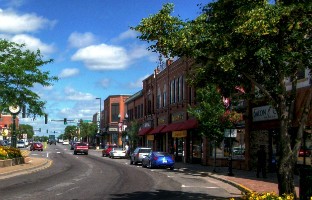Post-Wobegon politics: Michele Bachmann and the moral recession

Anoka, Minnesota, straddles the tannin-brown Rum River just as it meets the Mississippi, 20 miles north of Minneapolis. Like any place that has traveled the long arc from lumber boomtown to bedroom community, the 17,000-person town exists in layers. It includes stately Victorian frame houses and stolid 19th-century brick storefronts, an abandoned civic amphitheater and a dreary postwar courthouse, downtown antique malls and sprawl-scale convenience stores.
In 1960, Anoka's most famous son graduated from the local high school. Garrison Keillor's fictional Lake Wobegon is smaller and more isolated than his real-life hometown, but Anoka bears traces of the world of A Prairie Home Companion. The network of local institutions and unspoken compacts that Keillor once called "small-town socialism" is still at work, inspiring people to shop at Ralph's Pretty Good Grocery rather than seeking out the lower prices, bigger selections and wider aisles of the stores in Minneapolis-St. Paul.
In Religion and Public Life in the Midwest, written in 2004, sociologists Philip Barlow and Mark Silk describe the region this way: "The raw profit motive, driven by capitalist efficiency and resting on cultural individualism, was seen by many to be as much of a threat to their chosen way of life as were the gender, racial, and cultural changes of the 1960s." In Anoka, signs from the local Chamber of Commerce exhorting people to "Shop Anoka First" point to this community sensibility. It's reflected as well in the still-robust presence of the town's denominational churches.




